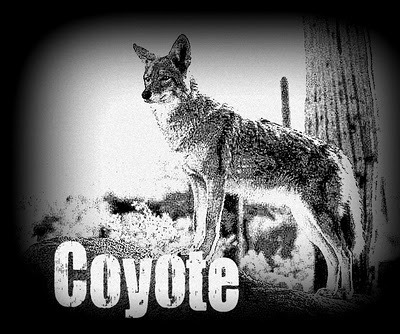Wildlife Classics: Coyotes

Accounts from
the American Frontier
The coyote's howl is more tonic
than all theories about nature.
--J. Frank Dobie
*
An Allegory of Want
Mark Twain
1872
The coyote is a long, slim, sick and sorry-looking skeleton,
with a gray wolf-skin stretched over it, a tolerably bushy tail that forever
sags down with a despairing expression of forsakenness and misery, a furtive
and evil eye, and a long, sharp face, with slightly lifted lip and exposed
teeth. He has a general slinking expression all over. The coyote is a living,
breathing allegory of Want. He is always hungry.
He is always poor, out of luck and friendless. The meanest
creatures despise him, and even the fleas would desert him for a velocipede. He
is so spiritless and cowardly that even while his exposed teeth are pretending
a threat, the rest of his face is apologizing for it. And he is so homely!--so
scrawny, and ribby, and coarse-haired, and pitiful. When he sees you he lifts
his lip and lets a flash of his teeth out, and then turns a little out of the
course he was pursuing, depresses his head a bit, and strikes a long,
soft-footed trot through the sage-brush, glancing over his shoulder at you,
from time to time, till he is about out of easy pistol range, and then he stops
and takes a deliberate survey of you; he will trot fifty yards and stop
again--another fifty and stop again; and finally the gray of his gliding body
blends with the gray of the sage-brush, and he disappears. All this is when you
make no demonstration against him; but if you do, he develops a livelier interest
in his journey, and instantly electrifies his heels and puts such a deal of
real estate between himself and your weapon, that by the time you have raised
the hammer you see that you need a minie rifle, and by the time you have got
him in line you need a rifled cannon, and by the time you have "drawn a
bead" on him you see well enough that nothing but an unusually long-winded
streak of lightning could reach him where he is now. But if you start a
swift-footed dog after him, you will enjoy it ever so much--especially if it is
a dog that has a good opinion of himself, and has been brought up to think he
knows something about speed.
The coyote will go swinging gently off on that deceitful
trot of his, and every little while he will smile a fraudful smile over his
shoulder that will fill that dog entirely full of encouragement and worldly
ambition, and make him lay his head still lower to the ground, and stretch his
neck further to the front, and pant more fiercely, and stick his tail out
straighter behind, and move his furious legs with a yet wilder frenzy, and
leave a broader and broader, and higher and denser cloud of desert sand smoking
behind, and marking his long wake across the level plain! And all this time the
dog is only a short twenty feet behind the coyote, and to save the soul of him
he cannot understand why it is that he cannot get perceptibly closer; and he
begins to get aggravated, and it makes him madder and madder to see how gently
the coyote glides along and never pants or sweats or ceases to smile; and he
grows still more and more incensed to see how shamefully he has been taken in
by an entire stranger, and what an ignoble swindle that long, calm, soft-footed
trot is; and next he notices that he is getting fagged, and that the coyote
actually has to slacken speed a little to keep from running away from him--and
then that town-dog is mad in earnest, and he begins to strain and weep and
swear, and paw the sand higher than ever, and reach for the coyote with
concentrated and desperate energy. This "spurt" finds him six feet
behind the gliding enemy, and two miles from his friends. And then, in the
instant that a wild new hope is lighting up his face, the coyote turns and
smiles blandly upon him once more, and with a something about it which seems to
say: "Well, I shall have to tear myself away from you, bub--business is
business, and it will not do for me to be fooling along this way all
day"--and forthwith there is a rushing sound, and the sudden splitting of
a long crack through the atmosphere, and behold that dog is solitary and alone
in the midst of a vast solitude!
It makes his head swim. He stops, and looks all around;
climbs the nearest sand-mound, and gazes into the distance; shakes his head
reflectively, and then, without a word, he turns and jogs along back to his
train, and takes up a humble position under the hindmost wagon, and feels
unspeakably mean, and looks ashamed, and hangs his tail at half-mast for a
week. And for as much as a year after that, whenever there is a great hue and cry
after a coyote, that dog will merely glance in that direction without emotion,
and apparently observe to himself, "I believe I do not wish any of the
pie."
The coyote lives chiefly in the most desolate and forbidding
desert, along with the lizard, the jackass-rabbit and the raven, and gets an
uncertain and precarious living, and earns it. He seems to subsist almost
wholly on the carcasses of oxen, mules and horses that have dropped out of
emigrant trains and died, and upon windfalls of carrion, and occasional
legacies of offal bequeathed to him by white men who have been opulent enough
to have something better to butcher than condemned army bacon.
We soon learned to recognize the sharp, vicious bark of the
coyote as it came across the murky plain at night to disturb our dreams among
the mail-sacks; and remembering his forlorn aspect and his hard fortune, made
shift to wish him the blessed novelty of a long day's good luck and a limitless
larder the morrow.
*
He saw a male coyote drag its belly along the ground to
distract the dogs, to give itself up while its mate ran to cover.
--William Least Heat-Moon
*
The Goods the Gods Gave
A. S. Barton
1909
I was mowing hay in my coulee, when I noticed, some distance
away, a Coyote carrying something in its mouth. He trotted down the hill and
with some difficulty through the long grass, but presently stopped and began to
bury his booty in a mole-heap, covering it with his nose, as a dog does. On my
approach he decamped and watched my proceedings from the nearest hill and,
curious to know what he had been burying, I unearthed his cache, and found, to
my surprise, a fine turkey gobbler, still warm and uninjured, except that its
neck was broken. I had no time and less inclination to advertise for an owner,
but accepted "the goods the gods gave" and carried my prize home.
*
Fierce Rascals
Richard Henry Dana
1840
Wooding excursions had always a mixture of something rather
pleasant in them. Roaming about in the
woods with hatchet in hand, like a backwoodsman, followed by a troop of dogs;
starting up of birds, snakes, hares and foxes, and examining the various kinds
of trees, flowers, and birds' nests, was at least, a change from the monotonous
drag and pull on shipboard. Frequently,
too, we had some amusement and adventure.
The coyote, fierce little animals, with bushy tails and large heads, and
a quick, sharp bark, abound here, as in all other parts of California. These, the dogs were very watchful for, and
whenever they saw them, started off in full run after them. We had many fine chases; yet, although our
dogs ran finely, the rascals generally escaped. Pursuit by us was in vain, and
in about half an hour a few of the dogs would come panting and straggling back.
*
The coyotes bark still in the woods, for they belong not to
man, and are not touched by his changes.
--Richard Henry Dana

Published on October 31, 2012 22:01
No comments have been added yet.





